US Ready To Return To Nuclear Deal If Iran Is Ready – White House
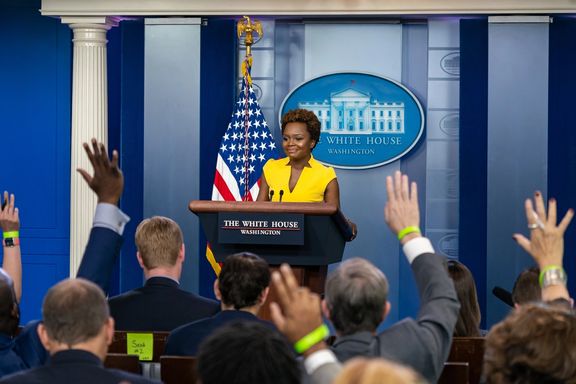
The White House says if Iran is prepared to comply with its commitments under the 2015 nuclear deal, the United States is ready to do the same.

The White House says if Iran is prepared to comply with its commitments under the 2015 nuclear deal, the United States is ready to do the same.
In response to a question about the Israel’s efforts to dissuade Washington from reviving the nuclear deal in a news briefing on Tuesday, White House press secretary Karine Jean-Pierre said, "The US and its allies are equally preparing for scenarios with or without mutual return to full implementation of the JCPOA (Joint Comprehensive Plan of Action).”
“The US president will only conclude a deal that he determines is in the national security interests of the US," she noted, adding that the ultimate goal is to make sure Iran never acquires nuclear weapons.
Earlier in the day, Prime Minister Yair Lapid said Israel will continue to act in all areas against the revival of the Iran nuclear agreement and the threat posed by the Islamic Republic.
During a visit to Nevatim airbase in southern Israel, which houses the Israeli Air Force’s squadron of F-35 fighter jets, he said it is too soon to know if Israel has succeeded in thwarting the looming nuclear agreement with Iran.
US Ambassador to Israel Thomas Nides said Monday that President Biden has assured Lapid that Washington will never tie Israel’s hands to defend itself against Iran. “We understand the aggression of Iran,” he said, adding that “[Biden] was very clear to the prime minister in that belief.”
Robert Menendez, the chairman of the Senate Committee on Foreign Relations, who was part of a congressional delegation visiting Israel, said on Monday that Biden has pledged to submit any agreement on Iran’s nuclear program to Congress for review.
Mossad chief David Barnea is also in Washington to attend closed-door classified meetings of House and Senate intelligence committees.

Prime Minister Yair Lapid says Israel will continue to act in all areas against the revival of the Iran nuclear agreement and the threat posed by the Islamic Republic.
During a visit to Nevatim airbase in southern Israel, which houses the Israeli Air Force’s squadron of F-35 fighter jets, he said it is too soon to know if Israel has succeeded in thwarting the looming nuclear agreement with Iran.
In a clear signal to Tehran, Lapid also issued a video message on the anniversary of Operation Orchard of September 6, 2007, when Israel destroyed Al Kibar site, a suspected nuclear reactor in the Deir ez-Zor region of Syria. Lapid reiterated “If Iran continues to test us, it will discover Israel’s long arm and capabilities.”
“We will continue to act in all fronts against terrorism and against those who seek to harm us," Lapid noted.
“As agreed between me and [US] President [Joe] Biden, we have full freedom of action to do whatever is appropriate to prevent Iran from the opportunity of becoming a nuclear threat,” Lapid added.
“It is still too early to know if we have indeed succeeded in stopping the nuclear agreement, but Israel is prepared for any threat and any scenario,” he added.
US Ambassador to Israel Thomas Nides said Monday that President Biden has assured Lapid that Washington will never tie Israel’s hands to defend itself against Iran. “We understand the aggression of Iran,” he said, adding that “[Biden] was very clear to the prime minister in that belief.”
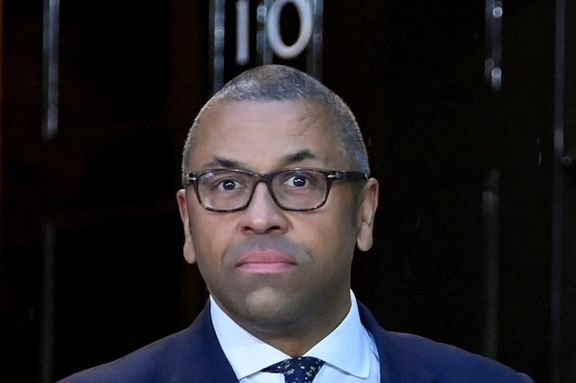
Britain’s new foreign secretary, James Cleverly, appointed today by new prime minister Liz Truss, held the Middle East brief at the foreign office 2020-22.
As minister of state for the Middle East, Africa and North America until February, Cleverly has direct experience of dealing with Iran. Three months after President Ebrahim Raisi took office, Cleverly met November 2021 in London with Ali Bagheri Kani, a deputy Iranian foreign minister and lead nuclear negotiator.“The new government coming in did give us an opportunity to reset,” Cleverly told Sky News later, in March 2022.
While Cleverly said immediately after the meeting he had urged Iran to return to the 2015 nuclear deal, his meeting with Bagheri-Kani seems to have centered on detained dual British-Iranian nationals Nazanin Zeghari-Ratcliffe and Anoosheh Ashoori. Families of the detainees and many analysts refused to believe claims by both Tehran and London that the detentions were not formally linked to Britain’s failure to honor a £400 million ($460 million) debt owed Iran for failure to deliver weapons in the 1970s that Tehran had paid for up front.
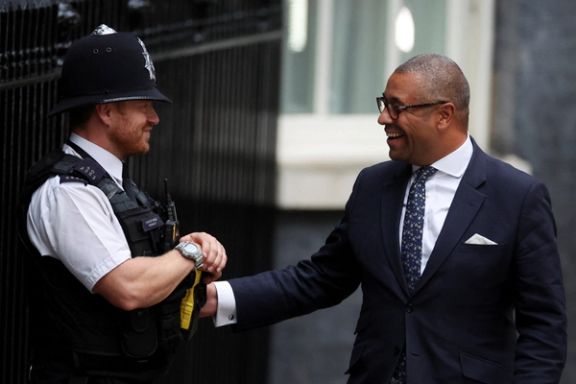
On the release of Zeghari-Ratcliffe and Ashoori in March 2022, Cleverly, still a minister of state but no longer covering the Middle East, said talks had been “incredibly difficult” and that London had taken “every precaution” that the £400 million would be used for ‘humanitarian’ purposes.
"There was a legal decision which went against the UK, and we abide by that legal decision, but there were practical difficulties,” Cleverly said. “You can't just write a cheque because of all those sanctions, because of all those counter-terrorism and counter-money laundering laws.”
He floated the idea that the talks over the debt repayment and prisoner release could set a wider precedent: “I would hope that Iran sees that a shift in their behavior can bring about positive changes, but ultimately, they are the ones responsible for this. And if they were to change their behavior, then the international posture towards them could be reviewed.”
Cleverly also insisted that Britain was working hard to secure the release of a third detainee in Iran, Morad Tahbaz, who holds US as well as British and Iranian nationality.
While some commentators have suggested Liz Truss may take a harder line towards Iran than her predecessor Boris Johnson, Truss’ long record of pragmatism suggests she may try to maintain a common approach with the Biden administration, France, and Germany. Cleverly, a strong Truss supporter who first joined the cabinet in only 2019 and currently education secretary, seems a ready ally in such an approach.

The fate of the nuclear deal is in Washington’s hands and it should be “free of Zionist pressures,” Iran's official government news website IRNA said Tuesday.
In an unsigned article, IRNA told it readers that Iran’s strategy in the nuclear talks, with President Ebrahim Raisi’s team in charge, is not to budge in the face of “media pressures” and “fake deadlines” that try to “to put the ball in Tehran’s court.”
After Iran stopped the nuclear talks for five months in 2021 and resumed it on November 29, Western negotiators began mentioning deadlines to urge Iran not to further delay the negotiations. But Tehran in early December 2021 said it would not accept “artificial deadlines”. In successive rounds of talks, US and European negotiators announced deadlines numerous times but the talks have dragged on for 17 months since they started in April last year.
Critics say that Western inaction after each passing deadline assured Tehran that it can play for time and in the meantime expand its nuclear program, both as a bargaining chip and in case talks failed, to further build on its progress. Iran has accumulated tens of kilos of 60-percent enriched uranium that it can further process for weapons-grade fissile material in a matter of weeks.
In August, as signs emerged that the Vienna talks might be making a breakthrough, Israel intensified its opposition to the draft agreement, arguing that it is a weaker deal than the original 2015 Joint Comprehensive Plan of Action (JCPOA), and began strongly lobbying the Biden Administration against making dangerous concessions to Tehran.
The Israeli statements and diplomatic steps have visibly angered Tehran. The IRNA article lists what Israeli leaders have said in recent days.
IRNA slamming Israeli pressures on the White House, acknowledged that US midterm elections in November make Biden’s job even more difficult.
It also said that given Iran’s reduction of its JCPOA commitments since early 2021 “decision making for the White House has become harder than ever...”
After Biden signaled his determination to return to the JCPOA in the fall of 2020, Iran passed a law December of that year to reduce its commitments and to increase enrichment to 20 percent. In February 2021, it opted for 60-percent enrichment, which it has continued since.
After weeks of Iranian officials and media highlighting Europe’s energy crisis this winter and hints that a nuclear deal can help alleviate the situation, IRNA said the obvious on Tuesday, that Iran does not have the ability to help Europe with natural gas. It then went on to claim that Iran would never use energy as a lever of pressure. To prove its point the website quoted Mohammad Marandi, a senior official in the negotiating team, as saying that Iran has never used oil and gas as a lever for pressure. However, he has also been touting the approaching winter and Europe’s energy crisis, alongside Iran’s hardline media such as the Fars news website.
IRNA also reiterated Iran’s demand that the a probe by the International Atomic Energy Agency (IAEA) into Iran’s pre-2003 undeclared nuclear activities should be closed before a deal is reached.
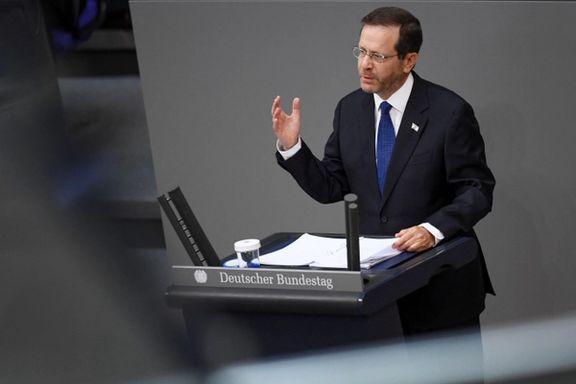
Israel’s president has addressed the German parliament, urging the legislators to stop the looming deal with Iran that threatens Israel and denies the Holocaust.
During his speech in the Bundestag on Tuesday, Isaac Herzog called the Islamic Republic “ineligible for concessions, under any circumstances,” and warned of “dark forces of hate, led by Iran” that threatens both Israel and stability in the Middle East, calling on the international community to stand on the “right side of history.”
Iran is behind “radical forces sowing terror, grief and devastation and seeking to menace everyone in the world,” he added, saying, “The possession of weapons of mass destruction by a UN member state that calls on a daily basis for the annihilation of another UN member state is simply inconceivable. Threats and endeavors to annihilate Israel are inconceivable.”
Following his meeting with German President Frank-Walter Steinmeier in Berlin, Herzog said “Iran is openly striving for Israel’s destruction, and the international community must treat it severely, firmly and assertively. Toothless and watered-down accords and sweeping benefits will not stop Iran.”
Reiterating that Iran “has proven that it cannot be trusted,” he said that Israel “will stand up and assertively and powerfully defend its citizens and Jewish communities all around the world. We expect our allies to stand firmly by our side at this hour.”
Germany is one of the main world powers currently negotiating the revival of the 2015 nuclear deal as an agreement is seen likely in the next few weeks despite persistent gaps between Tehran and Washington.

Supreme Leader’s Instagram post about a 7th century Imam’s peace with his enemy has caught media attention in Tehran as a possible sign of a nuclear compromise.
The post which was published on Ali Khamenei’s Persian Instagram Monday was an excerpt from a speech in April 1990 in which he discussed the reasons for the decision of the second Shiite Imam, Hassan ibn Ali, for making peace with his enemy, the founder and first caliph of the Umayyad Caliphate, Muawiya after ten years of war.
“Imam Hassan’s act was based on a logical argument which could not be disobeyed,” he had said in his speech and stressed that no one, even the first Imam, Ali ibn Abi Talib, who had not compromised with Muawiya’s father Abu Sufyan, would have chosen to take a different path under the circumstances of the time.
He also argued that Imam Hassan had taken the decision together with his brother, Hussein ibn Ali, the third Imam, who was later killed in a war with Muawiya’s forces in Karbala in 680 AD. Unlike Imam Hassan, the third Imam, is well known in Shiite history for being uncompromising toward the enemy, the Umayyads.
Khamenei also used the phrase “heroic flexibility” in the context of Iran's relations with the outside world in a very high-profile speech in September 2013 to Revolutionary Guard (IRGC) commanders.
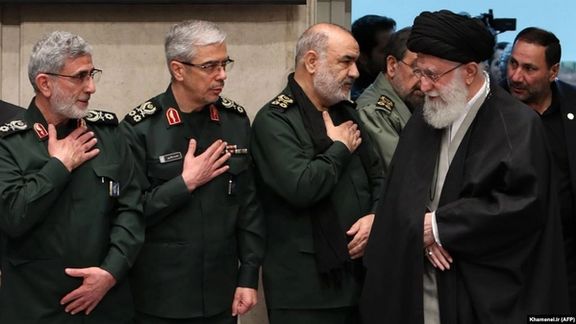
In his speech he stressed that he was not opposed to “proper political moves in diplomacy”. The phrase came from Iraqi Shia scholar Razi Ale Yasin’s book, Sulh-ul Hassan, which Khamenei translated into Persian under the title “Imam Hasan’s Peace: The most Magnificent Heroic Flexibility in History” in 1969.
Iranian Shiite clerics and officials often use references to the early Islamic history, particularly the life and actions of the prophet and the twelve Imams, as well as the Quran and other religious texts, when they discuss current affairs which requires interpretation of their statements.
“I believe in what was dubbed as ‘heroic flexibility’ many years ago [in the book],” Khamenei told the IRGC, adding that flexibility in certain circumstances could be positive and even required. He also argued that showing flexibility for “technical reasons,” while not forgetting “who the opponent and enemy is” can help a wrestler manoeuvre in his match to win, in the same way that the Imam's decision saved him and his followrs.
The media in Tehran have highlighted the Instagram post without any comments or interpretation on Tuesday, seeing its possible significance in the current political and international climate. But unlike 2013, when they immediately picked up the mention of “heroic flexibility” in the Leader’s speech and interpreted it as a sign of his consent to a nuclear deal, this time they have refrained from commenting.
Khamenei withheld his blessing to make a deal to restore the 2015 agreement between Iran and the world powers from the administration of President Hasan Rouhani, apparently fearing that credit for removal of US sanctions could help Rouhani and his allies to win in the June 2021 presidential elections against their hardliner rivals.
Rouhani has repeatedly claimed his government could have restored the deal if its path had not been blocked by powerful centres of power such as the hardline dominated parliament which passed legislation in December 2020 requiring the expansion of Iran’s nuclear program.